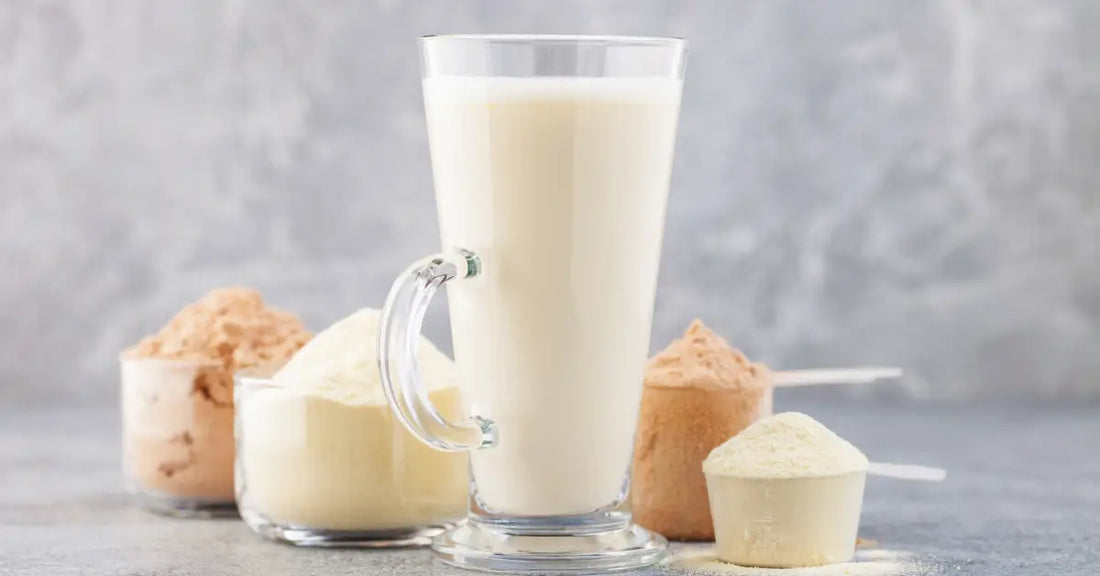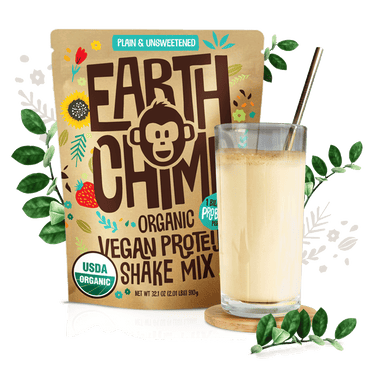Diving into the world of vegan protein powders is like stepping into a garden of possibilities. There are so many types to explore, each made from different plants. It's all about finding the one that fits you just right.
From pea to hemp, and brown rice to soy, each type of vegan protein powder has its own special touch. They come with their own flavors and benefits, making your choice a bit more exciting.
If you're keen on giving your meals a plant-powered boost, you're in for a treat. We're about to unwrap the details on these vegan protein stars. Ready to find your perfect match? Let's get started!
Types of Vegan Protein Powders
With vegan protein powders, it’s all about the plants they’re made from. There's a whole variety to choose from, each bringing its own little spark to the mix. It makes picking out your go-to powder kind of fun, knowing there’s one for just about everyone.
1. Pea Protein
Pea protein hails from the hearty yellow split peas, a different breed from the green peas we might nibble on as a snack. Though it's a bit low in the amino acid methionine, it's made a name for itself in the vegan protein space. It's appreciated for its substantial protein punch and easy-to-digest nature.
This protein type is known for its gentle, earthy taste. Some brands even offer flavored versions to subtly disguise the pea flavor. It's also a friend to those with sensitive stomachs or allergies, making it a considerate choice for many.
2. Hemp Protein
Hemp protein, derived from the seeds of a special breed of the cannabis plant, contains only trace amounts of THC, ensuring it's non-euphoric. Its low lysine content means it's not a complete protein, but it's valued for its mineral content and balanced omega-3 and omega-6 fatty acid profile.
Its nutty, earthy taste can have a unique, sandy texture, adding to its natural appeal.
3. Brown Rice Protein
Brown rice protein is the approachable neighbor in the protein community, known for its availability and budget-friendly price. It may not provide a full spectrum of amino acids on its own, but it's rich in BCAAs, aiding muscle maintenance and recovery.
With a reputation for supporting muscle growth, akin to whey protein, it's a favored choice. The protein often features a mild, nutty flavor, and when derived from sprouted brown rice, its nutrient profile is even more impressive. Opting for brands that test for arsenic is a smart move for safety.
4. Soy Protein
Soy protein is akin to the experienced athlete among protein powders. It's particularly valued in its non-GMO and organic forms, despite some concerns over GMOs and allergenicity.
Soy protein may aid in weight management and is especially suited for vegetarians and vegans. However, it's worth noting that soy is a common allergen, which might be a consideration for some individuals when choosing their protein source.
5. Pumpkin Seed Protein
Pumpkin seed protein is made from defatted pumpkin seeds, which significantly reduces the calorie content while maintaining a high protein level. This protein type is notable for being low in threonine and lysine, making it incomplete on its own.
6. Sunflower Seed Protein
Sunflower seed protein is relatively new to the vegan protein scene. It's made from sunflower seeds, which are naturally high in protein. This type of protein is low in the amino acid lysine but is a good source of all other essential amino acids, making it almost complete.
To boost its lysine content, sunflower seed protein is sometimes mixed with other proteins like quinoa. It's a great choice for those looking to add variety to their protein sources.
7. Sacha Inchi Protein
Sacha inchi protein comes from the star-shaped seeds of the sacha inchi plant, native to Peru. This protein is a bit more expensive due to its limited supply. It's packed with all the essential amino acids except for lysine.
Sacha inchi is especially rich in arginine, which is used by the body to produce nitric oxide. Nitric oxide helps widen blood vessels, improving blood flow and reducing blood pressure. This protein also provides ALA omega-3 fats, supporting heart health, making it a unique and nutritious addition to a vegan diet.
8. Chia Protein
Chia seeds, from the plant Salvia hispanica, have gained popularity for their nutritional benefits. They can be turned into chia protein powder, which might be more digestible than whole seeds.
This protein is low in lysine but has a high digestibility rate when powdered. This means more amino acids are available for your body to use, making chia protein a valuable component of a balanced diet.
9. Coconut Protein
Coconut protein is produced from the byproducts of virgin coconut oil extraction. This includes coconut skim milk and insoluble protein, which are then turned into a powder.
Coconut protein is known for its excellent emulsifying properties, making it ideal for use in emulsified vegan foods. It also has a high water hydration capacity, fat absorption capacity, and is easily wettable and dispersible.
With its high-quality sensory profile, coconut protein powder can enhance the nutritional value and texture of vegan dishes, particularly those requiring emulsification.
Blending for Balance

In the world of vegan protein powders, blending different plant proteins has become a popular way to achieve nutritional completeness. These blends often come with added flavors and sweeteners, making them a tasty option for those on a plant-based diet.
Achieving Amino Acid Harmony
One of the key benefits of plant protein blends is their ability to offer a full spectrum of essential amino acids. Since individual plant proteins might lack certain amino acids, combining them can create a more balanced profile.
For instance, pea protein is rich in lysine but low in methionine, while rice protein is just the opposite. By bringing them together, these blends ensure we're getting a bit of everything our body needs.
Enhanced Nutritional Value
Beyond just amino acids, these blends are designed with digestion in mind. Many include enzymes that help break down the proteins, making it easier for our bodies to absorb the nutrients. This thoughtful addition is especially helpful for those who might find certain plant proteins hard to digest.
Plant protein blends are not just about mixing different flavors; they're about creating a product that's as beneficial to our health as possible. With the thoughtful combination of proteins, added enzymes for digestion, and the use of sprouted or fermented ingredients, these blends offer a comprehensive approach to meeting our dietary needs.
The Benefits of Choosing Vegan Protein

Opting for vegan protein powders brings a bunch of benefits to the table. It's not just about keeping things plant-based; it's about what these proteins can do for our health and well-being.
Gentle on the Tummy
Many folks find vegan protein powders easier to digest. This is a big deal for anyone who's had a tough time with dairy-based proteins like whey. Plant proteins can be lighter on the stomach, making them a go-to for those with sensitive systems.
Allergy-Friendly
Another plus is that vegan proteins tend to be kinder to people with allergies. Since they're plant-based, they're free from common allergens found in animal products. This makes them a safe choice for anyone looking to avoid dairy, eggs, or shellfish.
Packed with Goodness
Vegan protein powders aren't just about protein. They often come with a host of other nutrients that support overall health. From vitamins and minerals to fiber and antioxidants, these powders can be a nutritional powerhouse.
Kind to the Planet
Choosing vegan protein also means taking a step towards a more sustainable lifestyle. Plant-based proteins generally have a lower environmental footprint compared to animal-based proteins. So, by going vegan, you're not just doing your body a favor, but the planet too.
Making the Right Choice
Choosing the right vegan protein powder can feel like a bit of a puzzle. With so many options, how do you pick the best one for you? Here are some pointers to help guide your choice.
Check the Label
Start by looking at the label. Quality is key, so keep an eye out for third-party testing. This ensures the product meets certain standards. Also, take a peek at the ingredient list. The simpler, the better. You'll want to avoid anything with a long list of additives you can't pronounce.
Taste and Texture Matter
Don't forget about taste and texture. These can make or break your protein shake experience. If you're unsure, try getting a sample size first. This way, you can test it out without committing to a giant tub of something you might not like.
Think About Your Needs
Consider your dietary needs. If you have allergies or sensitivities, make sure the protein powder is free from those allergens. And if you're avoiding GMOs, look for non-GM options. It's all about finding a powder that fits seamlessly into your lifestyle.
Environmentally Conscious Choices
Lastly, think about the impact on the planet. Opting for organic or sustainably sourced ingredients can make a difference. Plus, choosing a brand that aligns with your values can make your protein shake not just good for you, but good for the Earth too.
Choosing Your Vegan Protein Path

Selecting a vegan protein powder that suits you is a personal journey. With so many plant-based options, it's about finding the one that clicks with your health goals and tastes. If you're aiming for a powder that's gentle and packed with natural goodness, you're on the right track.
EarthChimp might just be the choice that fits seamlessly into your daily routine. This vegan protein powder blends organic pea, pumpkin, sunflower, and coconut proteins, all while staying true to being kind to your digestive system and the environment. No artificial flavors, no GMOs, and absolutely no dairy or gluten make it a wholesome choice.
In your search for the perfect vegan protein powder, think about one that aligns with both your nutritional needs and ethical values. EarthChimp could be the choice that effortlessly integrates into your daily routine, making your move to plant-based nutrition both enjoyable and fulfilling.
FAQ: Understanding Vegan Protein Powders
How do I use vegan protein powder in my diet?
You can mix vegan protein powder into smoothies, water, or milk. It's also great in recipes like pancakes or energy bars. Remember, it's meant to add to your diet, not replace whole foods.
Are there any vegan protein powders without artificial sweeteners?
Yes, you can find vegan protein powders without artificial sweeteners. Many brands focus on natural ingredients and avoid adding unnecessary chemicals or sugars.
What makes pea protein powder a good choice?
Pea protein is great because it's high in protein and easy for many people to digest. Though it's low in one amino acid, it's still a powerful protein source, especially when combined with other plant proteins.
Is hemp protein powder a complete source of protein?
Hemp protein is rich in nutrients and healthy fats, but it's low in the amino acid lysine, so it's not considered a complete protein on its own. Mixing it with other proteins can help balance your amino acid intake.
How long do vegan protein powders last?
Most vegan protein powders have a shelf life of about 12 to 18 months when unopened and stored properly in a cool, dry place. Once opened, it's best to use them within 6 to 9 months for the best taste and quality.
References:
- https://www.verywellfit.com/vegan-protein-powder-types-and-benefits-5524743
- https://www.healthline.com/nutrition/best-vegan-protein-powder
- https://pubmed.ncbi.nlm.nih.gov/22434355/
- https://www.medicalnewstoday.com/articles/323093
Disclaimer:
This statement has not been evaluated by the Food and Drug Administration. This product is not intended to diagnose, treat, cure, or prevent any disease.















